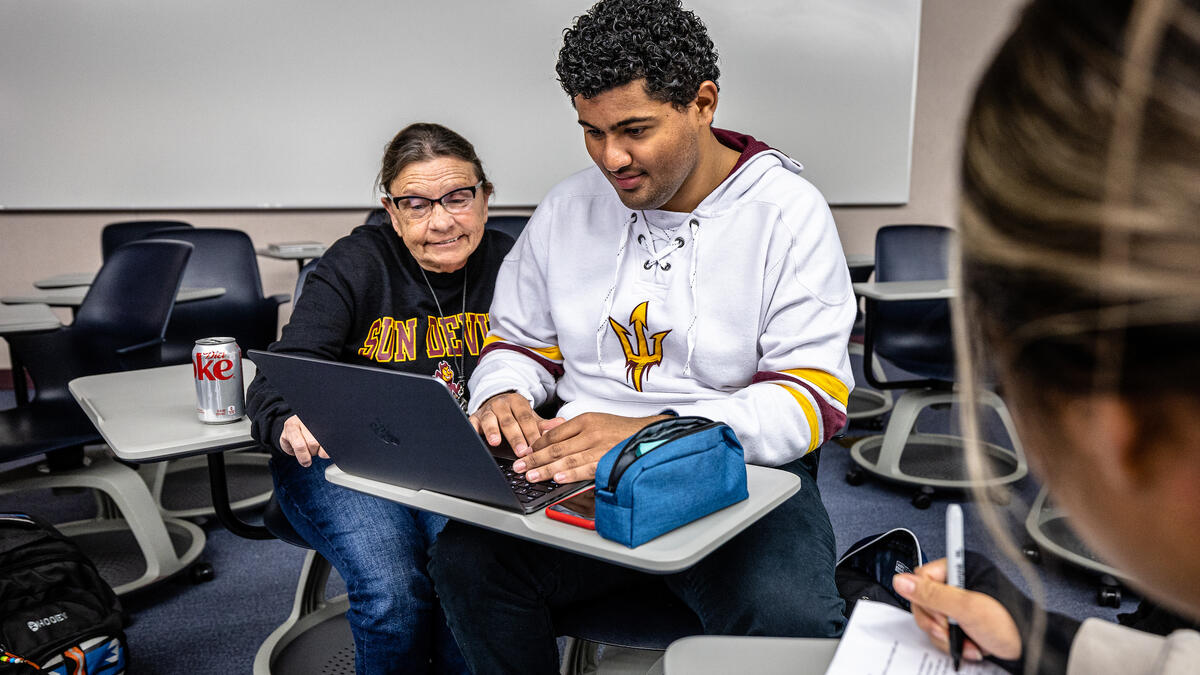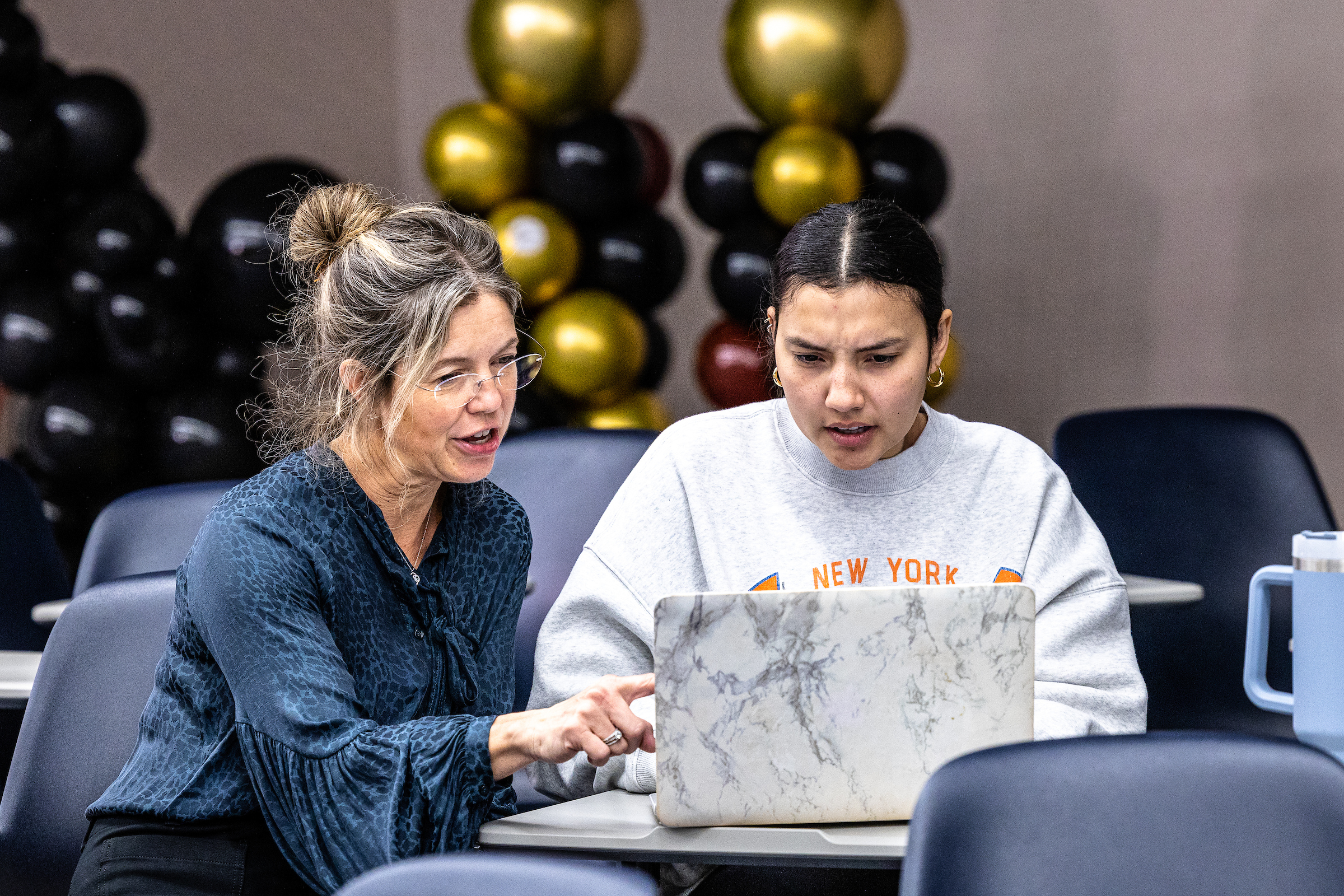For as long as she can remember, Ashley Schmiedeknecht has wanted to be a nurse.
But she got pregnant when she was a young woman, had a daughter and, well, her life went in a different direction.
As the years passed and her little girl became a teenager, Schmiedeknecht decided it was time to pursue her professional dream. There was only one problem: She didn’t want to disrupt her daughter’s life and leave Lake Havasu to attend Arizona State University’s Edson College of Nursing and Health Innovation on the Downtown Phoenix campus.
The solution: ASU brought a nursing degree to her.
Schmiedeknecht is one of 20 students in the Bachelor of Science in nursing (BSN) program being offered at ASU at Lake Havasu. It’s the opportunity she’s waited for, and one she can only now access because of ASU’s desire to provide educational opportunities to students in more rural or remote areas.
“Phoenix is three-and-a-half hours away from here,” Schmiedeknecht said. “There’s no way I would be able to travel back and forth and do that. It's really life-changing for me.”
Schmiedeknecht is part of the second cohort of nursing students taking advantage of the one-year BSN program. Those who have already earned a bachelor’s degree in another field are able to pursue nursing degree prerequisites, and students working on their first degree can complete the same prerequisites.
Once admitted to the nursing program, students complete 50 nursing-specific credits. Havasu students also travel to the Phoenix campus at various points for simulation and experiential learning at the Edson College Grace Center for Innovation in Nursing Education.
Video by Ken Fagan/ASU News
Salina Bednarek, director of the pre-licensure program at Edson, said the impetus for offering a nursing degree at Lake Havasu was twofold: First, as in Schmiedeknecht’s case, provide a degree program to students who for whatever reason cannot spend the year at the Edson College Downtown Phoenix campus.
Second, Bednarek hopes the students who get their nursing degree in Lake Havasu City will stay in the community and address the nursing shortage there. A for-profit hospital in the area has an entire fourth floor that goes unused because they don’t have enough staff, including nurses, according to Jeanette Nangreave, a physical chemist lecturing in support of the biology and environmental science programs at Lake Havasu.
RELATED: ASU at Lake Havasu celebrates 10 years of community education
Jeni Coke, a member of the Lake Havasu city council and director of marketing and public relations, and physician recruitment for the Havasu Regional Medical Center, said the shortage created in part by the pandemic — the Bureau of Labor Statistics estimates the U.S. will need more than 203,000 new registered nurses every year through 2026 to offset the losses in a retiring workforce — makes it imperative to “grow our own.”
“It’s so vital in the world we are living in post-COVID,” Coke said. “Nursing and physician recruitment us unlike anything we’ve ever seen.”
“Having a nursing program here where students are doing clinicals in the local area will hopefully inspire some of them to stay,” said Carla Harcleroad, executive director of ASU at Lake Havasu. “If a student wants to stay locally for family reasons or personal reasons, it can be a really good fit.”
Nursing faculty member Mandy Kwon (left) helps fourth-year BSN student Hannah Meredith during the NUR 315: Nursing Research and Application to Practice work session on Thursday, Feb. 23, at ASU at Lake Havasu. Photo by Charlie Leight/ASU News
An additional benefit for the students is cost. Tuition for a year at Lake Havasu is $6,500 compared to $12,000 at the Downtown Phoenix campus.
“That’s a selling point,” Bednarek said.
It was for Kassandra Nieblas, a Lake Havasu City native who got her degree in kinesiology and decided to pursue physical therapy as a career only to change her mind her senior year.
“So I had a meeting with my counselor down there (Downtown Phoenix campus), and the counselor was like, ‘Have you ever heard of Lake Havasu?’” Nieblas said. “I just laughed because I was born and raised here. Then they mentioned the nursing program to me.
“It means so much being able to get my degree here because I’m saving a lot of money. Not only tuition, but I moved back in with my mom, so I’m not paying rent. It’s really cool that somebody can get their bachelor’s degree in nursing here.”
Zane McLinn said the reduced tuition cost was one reason he decided to leave his hometown of Big Bear, California, which is more than a three-hour drive from Lake Havasu City.
“It’s more affordable than the bigger campus, so it makes more sense, financially speaking,” he said.
McLinn also was enticed by the smaller campus and class sizes.
“It’s very helpful for assignments and learning,” he said. “There’s certainly a lot more one-on-one with my instructors. It’s cool getting to know everyone."
The stories of Nieblas, McLinn and Schmiedeknecht bring a smile to Bednarek’s face. They epitomize one of the tenets of ASU’s charter: measured not by whom it excludes, but by whom it includes and how they succeed.
“My whole goal is to provide access to education, to anyone who otherwise may not have it,” Bednarek said. “And changing the way we deliver it, changing the locations in which we would deliver it, and changing the way we support students so that anyone who wants to be a nurse can be a nurse at any point in time.”
Top photo: Nursing Instructor Judy DesMarais works with fourth-year BSN student Tyler Howard in the NUR 315: Nursing Research and Application to Practice work session on Thursday, Feb. 23, at ASU at Lake Havasu. Photo by Charlie Leight/ASU News
More Health and medicine

Bird flu: Your questions on symptoms, spread and safety answered
Bird flu is no longer only “for the birds.”Infections have expanded beyond wild birds and poultry to a range of animals — from mice to mountain lions, dairy cows to domestic cats, and polar bears to…

Making medicine side-effect free
Many drugs that address medical conditions can come with serious side effects. In drug commercials, the litany of potential side effects is often longer than the benefits being touted. Carl…

Diagnostic research happening at ASU focused on detecting diseases earlier to save lives
It was one of America’s founding fathers, Benjamin Franklin, who may have foreshadowed today’s health care innovation when he quipped the adage: An ounce of prevention is worth a pound of cure.In…



